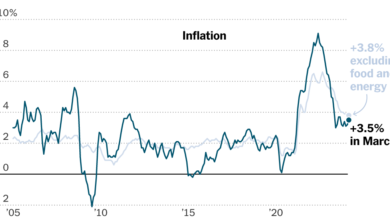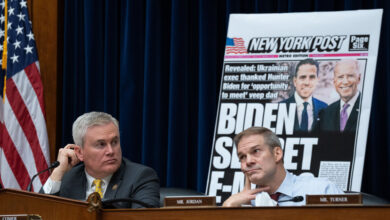Why the Paramount Deal Talks Failed

Why Redstone backed out
For months, Skydance Media’s effort to merge with Paramount — the studio behind “Mission: Impossible” and “Top Gun” — was the most-discussed M.&A. matter on Wall Street and in Hollywood. Now it has fallen apart.
What happened? The simple answer: Shari Redstone, who controls Paramount through the holding company National Amusements, just didn’t want to sell, according to DealBook’s Lauren Hirsch, who covered the talks with The Times’s Ben Mullin.
A deal was very close. Advisers for Paramount and Skydance had reached agreements on economic terms for a transaction and on other issues.
But the talks soured toward the end, and a fundamental question hovered over everything: Was the Redstone family finally ready to part with the media empire it has owned for decades?
The other issues at play: Trust between Redstone and Skydance had eroded significantly, in large part because of numerous leaks to news organizations. Redstone was annoyed that Skydance altered its offer — a complicated transaction that involved buying control of National Amusements and then merging with Paramount — by reducing its value of Redstone’s holding company to $1.7 billion from $2 billion.
Meanwhile, Charles Phillips, a former Oracle executive and a member of the Paramount special committee, was unconvinced by the offer.
At the end of the day, however, Redstone didn’t want to sell.
A brief email signaled the end. Right before Paramount’s special committee voted on the deal, a lawyer for National Amusements messaged the members to say the Redstone-controlled vehicle was ceasing discussions with Skydance.
The email added that though National Amusements and Skydance had ironed out financial issues, they could not agree on unspecified “noneconomic terms.”
What now? Redstone could pursue a sale of her stake in National Amusements with one of the suitors that has emerged in the past few weeks, including the Hollywood producer Steven Paul or the media executive Edgar Bronfman Jr. But those conversations are still in early stages.
Redstone could also keep control of Paramount. She recently endorsed a plan by the company’s Office of the C.E.O., composed of its three top executives, that included $500 million in cuts and finding a partner for the Paramount+ streaming service in case a deal didn’t happen.
But that would mean continuing to grapple with difficult challenges, including the demise of traditional television, which is erasing the value of properties like Nickelodeon, and paying down the company’s $15 billion in debt.
HERE’S WHAT’S HAPPENING
Apple rejoins the $3 trillion valuation club. Shares in the iPhone maker hit a record on Tuesday, in their biggest one-day jump since November 2022, as investors hoped its push into artificial intelligence would spur a surge in upgrades. Probably not factoring into that rally is the Vision Pro, the $3,500 virtual reality headset that will soon be for sale in Asia and Europe, but which has struggled in the U.S.
The European Union is said to again delay contentious bank trading rules. The so-called Basel requirements, which would force large lenders to hold more capital, will not go into effect on Jan. 1, because lawmakers want more time to implement the global standards, Bloomberg reports. Similar rules are in limbo in the U.S., as the banking industry pushes to delay or water down the initiative.
The World Bank raises its economic outlook. The organization’s economists expect the global economy to grow 2.6 percent this year, up from the 2.4 percent increase they forecast in January. The World Bank warned, however, that tariffs and protectionist policies could limit growth.
Ukraine plans to sell state assets to pay for its war effort. Kyiv is set to auction off dozens of state-owned companies, including a landmark hotel, as it seeks to raise roughly $100 million for its military spending needs. That effort comes as Europe and the U.S. remain far apart on negotiations for a $50 billion loan to Ukraine that would be backed by seized Russian assets.
Musk’s pay vote comes down to the wire
Polls are set to close overnight on Elon Musk’s multibillion-dollar pay plan at Tesla, but the shareholder vote — perhaps the most consequential one on compensation in recent corporate history — looks extremely close.
Here’s what DealBook has heard about how it is shaping up.
A few things to keep in mind: Tesla is expected to announce preliminary vote results at its annual meeting on Thursday, with final certification set for Friday. Approval of the compensation plan requires that a majority of votes cast aren’t controlled by Musk. He owns about 13 percent of Tesla’s stock.
How Tesla’s biggest shareholders will vote is a mystery. Together, Vanguard, BlackRock and State Street own about 16.7 percent of Tesla’s outstanding shares. But these firms don’t tend to vote until late in a corporate election process.
It’s also unclear how much they’ll be swayed by the two main shareholder advisory firms, Institutional Shareholder Services and Glass Lewis, both of which have recommended voting no.
Can retail shareholders make up the difference? They account for an unusually high percentage of the investor base at Tesla compared with other S&P 500 companies, and tend to vote far more in favor of management. (This past weekend, Musk posted on X that about 90 percent of retail investors who had voted by that point supported the pay plan.)
The trouble is, such shareholders tend not to vote at all. (Corporate advisers would be happy if half of individual investors voted in any given company’s elections.) That’s why Musk and allies like the podcaster Lex Fridman are urging them to participate.
Tesla watchers are unsure of the outcome. Toni Sacconaghi, an analyst at Bernstein, predicted this week that the plan wouldn’t win approval, citing the daunting math involved. But investors surveyed by Adam Jonas, an analyst at Morgan Stanley, said they believed it would pass.
Musk is in the news on other fronts:
-
He withdrew his lawsuit against OpenAI and the company’s C.E.O., Sam Altman, which accused the two of breaching the start-up’s founding contract by prioritizing commercial interests over the public good.
-
The Wall Street Journal reported on what it said were sexual relationships and other boundary-pushing interactions that Musk had with several women who worked at SpaceX.
The E.U. goes after Chinese E.V.s
The European Union on Wednesday said it would slap tariffs of up to 38 percent on Chinese-made electric vehicle imports, a month after the Biden administration imposed its own restrictions.
The new duties will slow Chinese E.V. makers’ push into Europe and the U.S., but it’s less certain whether they will kill Beijing’s ultimate ambition to dominate the sector worldwide.
Europe is a big market for Chinese E.V.s. Exports have soared to $11.5 billion last year from $1.6 billion in 2020, according to the research firm Rhodium Group. By contrast, few Chinese-made E.V.s are sold in the U.S. Lawmakers on both sides of the Atlantic say that Beijing unfairly subsidizes its carmakers, putting Western rivals at a serious disadvantage.
European governments and carmakers are split on a response. France and Spain, whose carmakers have a limited footprint in China, have lobbied for punitive measures.
But Germany has pushed back. Berlin is worried about retaliation: China accounted for 40 percent of Volkswagen sales last year and the boss of Mercedes-Benz has even argued for lower duties on Chinese E.V. imports.
Don’t expect Chinese carmakers to stall. Many companies have made adjustments in anticipation of being targeted. Geely acquired the Swedish brand Volvo and is expanding manufacturing inside the E.U. and North America, which could help it to dodge penalties.
“It doesn’t change the endgame,” Bill Russo, the C.E.O. of Automobility, a Shanghai-based consulting firm and former head of Chrysler in Asia, told DealBook. Chinese companies dominate global E.V. production and the supply chain, enabling them to build more affordable cars than their Western rivals.
That’s not going to end, especially as governments — including those in the U.S. and the E.U. — push the green transition.
What next? The tariffs could ratchet up a Beijing-Brussels trade war, expanding into sectors like aerospace and luxury goods. Chinese carmakers have the room to absorb the tariffs and still be competitive on price.
“Chinese carmakers will eventually encircle the E.U. and the U.S.,” Russo predicted, and they all think they can expand in the West over the long term as well in fast-growing markets including Southeast Asia, South America and the Middle East.
A towering real estate crisis
Sky-high interest rates and a pandemic-induced shift to remote work have battered the $2.4 trillion office building sector, sapping city budgets and clobbering investors, including large pension funds.
The commercial real estate crisis could worsen drastically as office buildings sell at steep discounts, The Times’s Matthew Goldstein reports.
Office vacancies are growing, too. Tenants are reducing or vacating office space to landlords at a record clip, according to CoStar, a company that tracks the industry.
Investors are feeling the pain. Mortgages that were packaged into commercial real estate bonds were foreclosed on or extinguished on 16 office buildings in the U.S. this year, according to Trepp, a data and research firm. That resulted in $500 million in investor losses, a near doubling of the $265 million hit last year.
Some warn of more problems on the horizon. In an effort to stave off a tsunami of foreclosures or fire sales, many banks and investors in bonds backed by real-estate loans are eager to give struggling property owners more time to potentially renegotiate leases.
There’s a lot at stake. Of the $171 billion worth of office building mortgages that have been packaged into bonds, Trepp has placed more than a quarter on its watch list.
Meanwhile, developers are looking to repurpose empty offices. Cities like Chicago have offered builders grants to convert office buildings into affordable housing. In October, the Biden administration directed the Department of Transportation to make $35 million in financing available for such transformations.
But conversions are expensive, and not all buildings can be easily retrofitted.
THE SPEED READ
Deals
Elections, politics and policy
-
The Trump and Biden campaigns will hold rival fund-raisers in London this evening. The Vogue editor Anna Wintour will host an event for President Biden while Howard Lutnick, the chair of Cantor Fitzgerald, is set to co-host Trump’s event. (FT)
-
“A Guilty Verdict for Hunter Biden Weighs on a Worried President Biden” (NYT)
Best of the rest
-
Joey Chestnut, the longtime champion of Nathan’s Famous Hot Dog Eating Contest, and the organization behind the competition are parting ways after he signed an endorsement deal with a rival, Impossible Foods. (NYT)
-
“Alexander Hamilton’s bank is getting a new name: BNY” (Reuters)
We’d like your feedback! Please email thoughts and suggestions to dealbook@nytimes.com.



